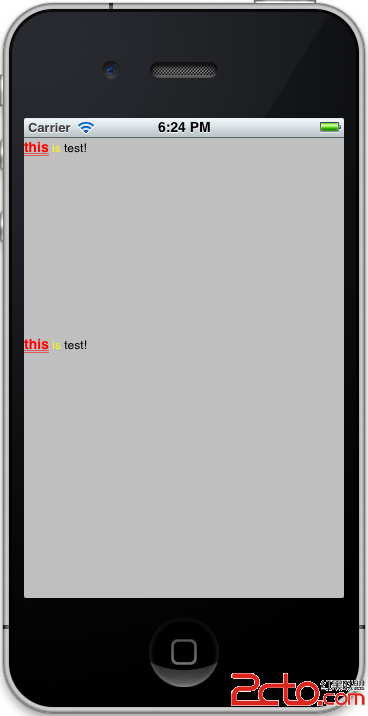首先導入CoreText.framework,並在需要使用的文件中導入:
#import<CoreText/CoreText.h>
創建一個NSMutableAttributedString:
NSMutableAttributedString *attriString = [[[NSMutableAttributedString alloc] initWithString:@"this is test!"]
autorelease];
非常常規的創建方式,接下來我們給它配置屬性:
//把this的字體顏色變為紅色
[attriString addAttribute:(NSString *)kCTForegroundColorAttributeName
value:(id)[UIColor redColor].CGColor
range:NSMakeRange(0, 4)];
//把is變為黃色
[attriString addAttribute:(NSString *)kCTForegroundColorAttributeName
value:(id)[UIColor yellowColor].CGColor
range:NSMakeRange(5, 2)];
//改變this的字體,value必須是一個CTFontRef
[attriString addAttribute:(NSString *)kCTFontAttributeName
value:(id)CTFontCreateWithName((CFStringRef)[UIFont boldSystemFontOfSize:14].fontName,
14,
NULL)
range:NSMakeRange(0, 4)];
//給this加上下劃線,value可以在指定的枚舉中選擇
[attriString addAttribute:(NSString *)kCTUnderlineStyleAttributeName
value:(id)[NSNumber numberWithInt:kCTUnderlineStyleDouble]
range:NSMakeRange(0, 4)];
return attriString;
這樣就算是配置好了,但是我們可以發現NSAttributedString繼承於NSObject,並且不支持任何draw的方法,那我們就只能自己draw了。寫一個UIView的子類(假設命名為TView),在initWithFrame中把背景色設為透明(self.backgroundColor = [UIColor clearColor]),然後在重寫drawRect方法:
-(void)drawRect:(CGRect)rect{
[super drawRect:rect];
NSAttributedString *attriString = getAttributedString();
CGContextRef ctx = UIGraphicsGetCurrentContext();
CGContextConcatCTM(ctx, CGAffineTransformScale(CGAffineTransformMakeTranslation(0, rect.size.height), 1.f, -1.f));
CTFramesetterRef framesetter = CTFramesetterCreateWithAttributedString((CFAttributedStringRef)attriString);
CGMutablePathRef path = CGPathCreateMutable();
CGPathAddRect(path, NULL, rect);
CTFrameRef frame = CTFramesetterCreateFrame(framesetter, CFRangeMake(0, 0), path, NULL);
CFRelease(path);
CFRelease(framesetter);
CTFrameDraw(frame, ctx);
CFRelease(frame);
}
在代碼中我們調整了CTM(current transformation matrix),這是因為Quartz 2D的坐標系統不同,比如(10, 10)到(20, 20)的直線坐標:
坐標類似於數學中的坐標,可以先不調整CTM,看它是什麼樣子的,下面兩種調整方法是完全一樣的:
CGContextConcatCTM(ctx, CGAffineTransformScale(CGAffineTransformMakeTranslation(0, rect.size.height), 1.f, -1.f));
==
CGContextTranslateCTM(ctx, 0, rect.size.height);
CGContextScaleCTM(ctx, 1, -1);
CTFramesetter是CTFrame的創建工廠,NSAttributedString需要通過CTFrame繪制到界面上,得到CTFramesetter後,創建path(繪制路徑),然後得到CTFrame,最後通過CTFrameDraw方法繪制到界面上。
如果想要計算NSAttributedString所要的size,就需要用到這個API:
CTFramesetterSuggestFrameSizeWithConstraints,用NSString的sizeWithFont算多行時會算不准的,因為在CoreText裡,行間距也是你來控制的。
設置行間距和換行模式都是設置一個屬性:kCTParagraphStyleAttributeName,這個屬性裡面又分為很多子
屬性,其中就包括
kCTLineBreakByCharWrapping
kCTParagraphStyleSpecifierLineSpacingAdjustment
設置如下:
//段落
//line break
CTParagraphStyleSetting lineBreakMode;
CTLineBreakMode lineBreak = kCTLineBreakByCharWrapping; //換行模式
lineBreakMode.spec = kCTParagraphStyleSpecifierLineBreakMode;
lineBreakMode.value = &lineBreak;
lineBreakMode.valueSize = sizeof(CTLineBreakMode);
//行間距
CTParagraphStyleSetting LineSpacing;
CGFloat spacing = 4.0; //指定間距
LineSpacing.spec = kCTParagraphStyleSpecifierLineSpacingAdjustment;
LineSpacing.value = &spacing;
LineSpacing.valueSize = sizeof(CGFloat);
CTParagraphStyleSetting settings[] = {lineBreakMode,LineSpacing};
CTParagraphStyleRef paragraphStyle = CTParagraphStyleCreate(settings, 2); //第二個參數為settings的長度
[attributedString addAttribute:(NSString *)kCTParagraphStyleAttributeName
value:(id)paragraphStyle
range:NSMakeRange(0, attributedString.length)];
這並不是唯一的方法,還有另一種替代方案:
CATextLayer *textLayer = [CATextLayer layer];
textLayer.string = getAttributedString();
textLayer.frame = CGRectMake(0, CGRectGetMaxY(view.frame), 200, 200);
[self.view.layer addSublayer:textLayer];
CATextLayer可以直接支持NSAttributedString!
效果圖:

